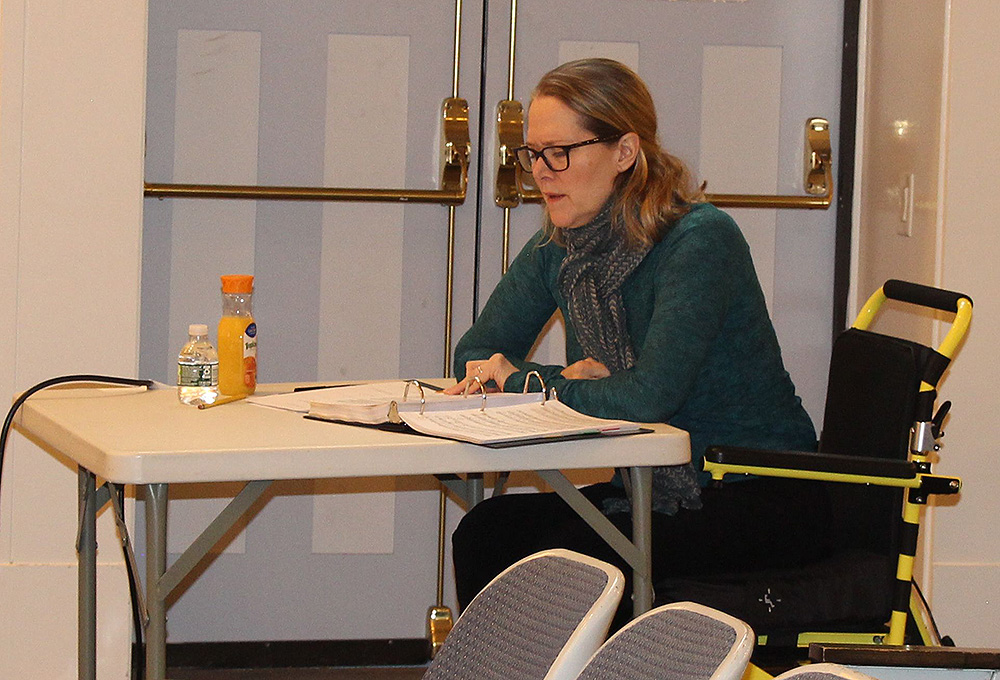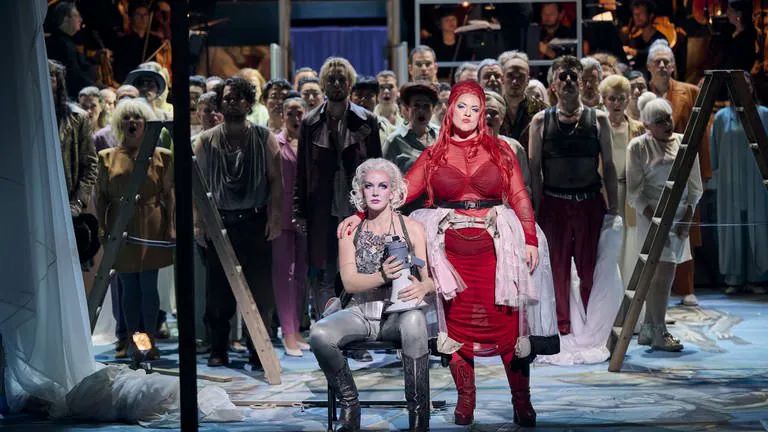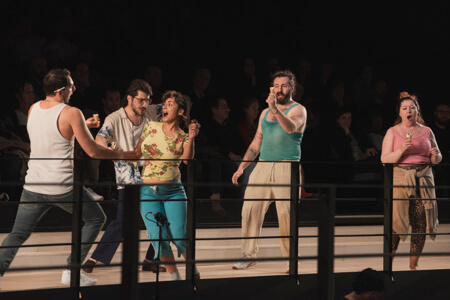
The theater community continues to mourn the passing of our beloved colleague Rebecca Luker. A star taken too quickly from us by ALS on 23 December 2020, Rebecca stood for excellence and her name was known the world over for her incandescent and expressive voice. Rebecca was a friend of the Kurt Weill Foundation and adjudicated the Lotte Lenya Competition as a finals judge in 2011, 2012, and 2015, and a semifinals judge and coach in 2013, 2014, and 2020. The young singing actors who benefited from the expertise of this great artist will no doubt forever cherish her guidance and perspective.
Becca was my guide, too.
Becca came into my life very near the end of her own, although I was a long-time fan of her work, and wished from the very first time I saw her onstage to have a career like hers someday. I was a year and half older, but she was the shining example of what sopranos aspire to: thrilling sound, ease and flexibility, wit, intelligence, storytelling. But Becca had much more. Her voice was simply a map of her gigantic heart and the curious depth of love for humanity and this earth. Becca sang what she knew: love. In every note you can hear the texture of care, the nuance of compassion, the breath of ease and consolation. When Becca sang, she showed us who she was and gave us the gift of honest presence.
We never worked together as actors; our skill sets and age proximity meant we were often up for the same parts. But I was fortunate to work with her amazing husband Danny Burstein, ironically as his “stage wife” twice, in Follies at the Ahmanson Theatre in Los Angeles and The Snow Geese in 2013 on Broadway. In order to do The Snow Geese, I had to take a leave of absence from Rodgers and Hammerstein’s Cinderella where I was playing Marie (the Fairy Godmother), and who took my place? Becca. I remember leaving my dressing room as perfect and tidy as possible because, you know, I was getting it ready for Rebecca Luker. At receptions and parties, benefits and events, I would seek Becca out and we would make small talk and joke about being Danny’s wives. And then in the fall of 2018 we cast Rebecca in a one-woman musical monologue called Scaffolding by Jeff Blumenkrantz which I would be directing. That was the real beginning of a friendship that lasted until the end of her life.
Scaffolding is about a single mother who hides the diagnosis of her high school-aged boy’s Asperger’s from him, which eventually leads to the destruction of their relationship. It was emotional and gritty. Not typical soprano territory. But directing Becca was like having a long juicy lunch date with a girlfriend. Conversations and questions. She dared everything. She never settled. She came in on the first day of rehearsal with everything memorized. The score was challenging with 36 minutes of continuous singing. Jeff and I were amazed by her stamina and energy. What I hadn’t known watching her onstage was what a willing and tireless collaborator she was. She gave me her trust and encouraged me to keep digging and exploring. She gave a thrilling performance that was brave, raw, and funny, and impeccably sung. I started to plot all the future projects we would work on together.
When that project ended, I immediately went to Duke University to finish an Artist-in-Residency and to direct a student workshop of a new adaptation of Love Life by Kurt Weill and Alan Jay Lerner. Three days before the final presentation, my 94-year-old mother died suddenly. A few months later, another close family member was re-diagnosed with cancer, and we were on a short list of family that visited her as often as we could. In the fall of 2019, I received a call from Jeff asking me if I had heard about Becca. I hadn’t.
I called her right away and she said she had been having trouble with her legs not responding well, and that she wasn’t sure, but it could be serious. She told me not to worry, that she was fighting it and she was going to win. In the following months, as Becca’s disease continued to worsen, so did my sister-in-law’s cancer. At the end of March 2020, two weeks after Broadway shut down, and the scheduled production of Love Life at New York City Center abruptly ceased, my sister-in-law succumbed to cancer. It wasn’t until the summer that I heard that in spite of the raging COVID pandemic in New York City, there was a pipeline of Danny and Becca’s close friends who were going to their apartment to help care for her. I hesitated. With all of my grief already so close to the surface, could I be of any use to Becca or Danny? And selfishly I wondered if I could hold it together seeing my precious friend in a wheelchair unable to move freely. I decided to wait. I sent my love through other friends. I worked out of town briefly. I texted and called.
Finally in the fall, I summoned the courage to get on “the list.” I went over to her wheelchair and knelt by her side and apologized for waiting so long to see her. I started to cry. She looked at me with determined blue eyes and said, “It doesn’t matter. You’re here now.” She explained that no crying was allowed. Crying made everything harder. We decided to tell stories and laugh. Cackle actually. Over the next few weeks, I gave her a pedicure, brought treats for Danny, soup for Becca, helped her sip iced coffee, fed her, brushed her hair, held her hand, massaged her neck, anything she needed. As the disease progressed, she remained heroically strong and positive. She was side-splittingly funny. The miracle was that even while enduring excruciating suffering, Becca was taking care of me. Before I could say a word to her, she would always ask about my family, my husband, my son, what I was working on, ever the loyal and enthusiastic cheerleader. We talked about singing, theater, music, life. The irony of being so mentally sharp yet physically trapped. Eternally curious and thoughtful, she would thank me countless times in a visit. The last time I saw Becca was only a few days before she died. She had lost the ability to speak but being such a great actress, she could communicate with her eyes and her expression. I left her in the gentle care of Danny and two caregivers who were in the apartment that morning. And now it will be my privilege to say back to Rebecca what she so often said to others:
Thank you, my friend.


